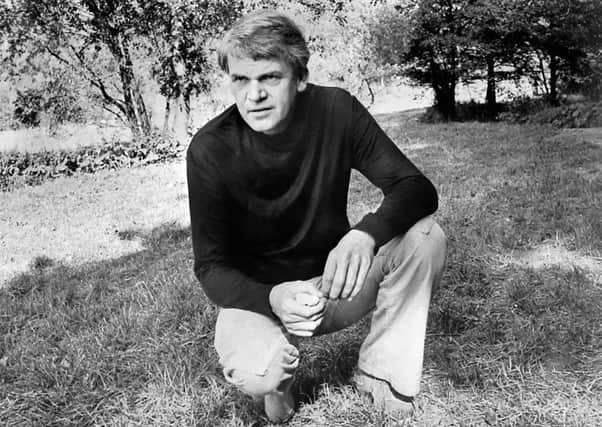Book review: The Festival of Insignificance


The Festival of Insignificance by Milan Kundera
Faber & Faber 115pp, £14.99
What it is to have an international reputation. The Festival of Insignificance – delightfully unpretentious title – is a slim volume, even when padded out by generous spacing and wide margins. There is no plot, no coherent narrative.
It is inconsequential in matter, whimsical in manner; and Faber & Faber confidently demand £14.99 for it. Well we may all, reviewers especially, be grateful to a writer who practises economy at a time when so many novels proclaim their importance by coming in at 500 pages or even more. Milan Kundera is the slim man who has escaped from the fat person’s body.
Advertisement
Hide AdIn the first passage Alain strolling along a Paris street observes that every girl is displaying her navel “between trousers belted very low and a T-shirt cut very short”. He is captivated. “It was as if their seductive power no longer rested in their thighs, their buttocks, or their breasts, but in that small round hole located in the centre of the body.” Odd change; the navel is associated with motherhood, on account of the umbilical cord. Did Eve, he later wonders, have a navel. Do angels? Surely not, in both cases. If Alain is obsessed by the question it is because his mother wanted to abort him, he hasn’t seen her since he was ten, and he imagines a scene in which she tried to drown herself, but instead drowned a boy who leaped into the river to save her. And he has imaginary conversations with the mother who would rather he had never been born. Because he is a gentle man and by his nature an apologiser, they are quite agreeable conversations.
Alain and his friends, Ramon, Charles and Caliban, all for different reasons agreeably idle, and therefore conscious of the shifts of time, come to dwell on what Ramon calls the insignificance which is “the essence of existence… the key to wisdom … the key to a good mood.” Savour the moment because it is all that you have, all that is left to us.
The heroic days when men set out to change the world are over. This is why they talk a lot about Stalin, the great world-changing figure. And what survives of him? Not even his statues? The friends are fascinated by an absurd story in Khruschev’s memoirs about Stalin shooting 24 partridges. It was a story with which he liked to bore and anger the members of the Politburo. They knew he was lying but didn’t dare to say so till they were in the urinals and, as they thought, out of his hearing. Did none of them realise Stalin was joking? Of course not: jokes had been abolished.
But what now survives of Stalinism? The city of Kaliningrad which used to be Konigsberg, the home city of Immanuel Kant, the great Enlightenment philosopher. But who was Kalinin? The least significant member of the Politburo, for whom Stalin felt an emotion he had almost forgotten – affection. Why? Because the poor man suffered from an enlarged prostate and an urgent need to urinate frequently which he couldn’t leave the room to do so while Stalin held forth, about Kant’s “das Ding an sich”or the 24 partridges or whatever.
Kundera himself, born a Czech (though he now writes in French) was a child of the Age of Ideology, which was also the age of the Lie, the age of Repression and, for most people, self-repression too. He has shrugged all that off and views the world today with a smile. None of his characters is important – only a couple are even self-important. They are people who get through the day by getting by. One of them, Caliban, an out-of-work actor who assists a friend by helping out as a waiter at cocktail parties, pretends to be a Pakistani, and speaks in a language he has invented for himself. Not so easy, as the author remarks: “as an improvisation, try talking in a fictional language for even thirty seconds! You’ll keep repeating the same sounds time and again, and your babble will be instantly unmasked as a sham”. Actually he has become bored with the game, but is stuck with it. It’s hard to remove the mask you have chosen to wear, hard for anyone, even Stalin.
This is a slight book, and a slippery one, hard to keep hold of. Perhaps it amounts to nothing but a snatching at, and celebration of, moments in everyday life. Not that we ever really know each other completely, of course. We’re fortunate if we do so even a little. Ramon, who has recently joined “the dismal ranks of the retired”, has “a theory about observation posts standing each on a different point in history, from which people talk together unable to understand each other.” Kundera is fascinated by such questions. One character visits his doctor and is told that tests reveal he doesn’t have cancer. Why then, meeting a friend in the Luxembourg Gardens, does he say he’s just had bad news, cancer I’m afraid? He doesn’t know what has prompted him. It is not even as if he wants sympathy and it would be absurd to seek sympathy for a non-existent cancer. Indeed it would be absurd. But then, in Kundera’s world, absurdity is the one constant. Happily, today, it comes in gentler forms.